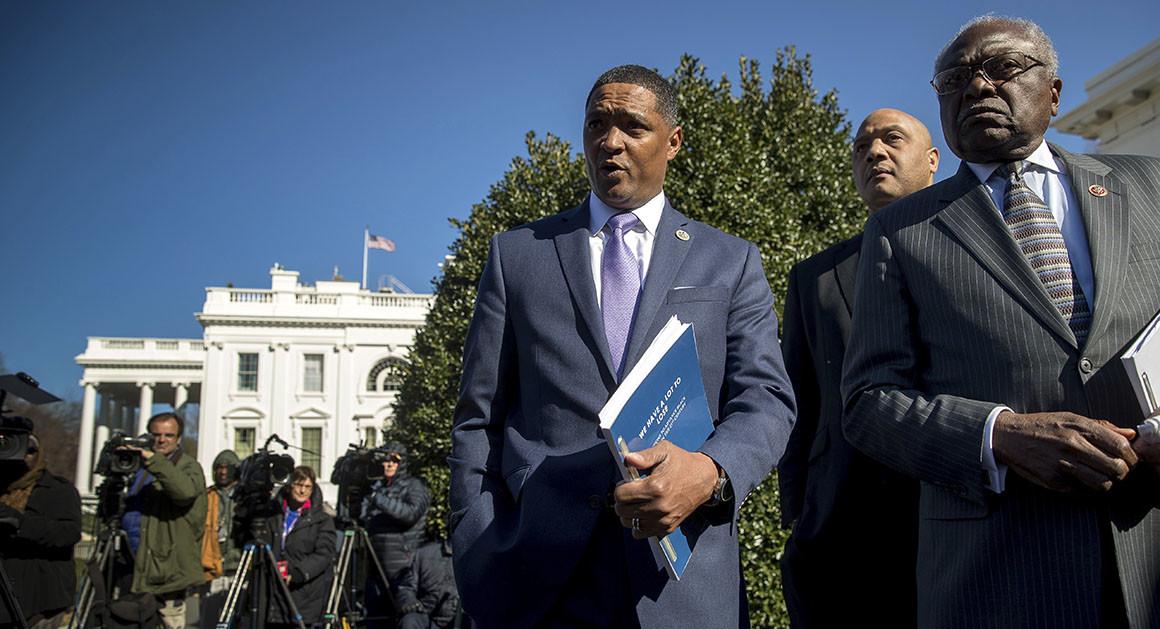‘It’s not gonna be business as usual’


Continue to article content
Lawmakers are divided over whether they think Clyburn would challenge House Minority Whip Steny Hoyer (D-Md.), the current No. 2 Democrat, or run for majority leader only if the spot were open.
Clyburn’s office declined to clarify. But the longtime South Carolina Democrat told POLITICO in a brief interview: “I’m not making any plans to do anything yet. All I’m trying to do now is win the House back.”
He added, however, that he’ll know whether he’s running for a higher post “the morning after the election.” Then he laughed and walked away.
Hoyer has said privately he would run for House speaker if current Minority Leader Nancy Pelosi (D-Calif.) leaves. Rep. Joe Crowley (D-N.Y.), current chairman of the House Democratic Caucus, is also eyeing the speakership if Pelosi retires.
Other members have said privately they think Clyburn will leave when Pelosi retires, as long as it’s guaranteed a CBC member will succeed him as a member of leadership.
Clyburn also declared over the weekend that the entire Democratic leadership team should be replaced if the party fails to win the House. The comments at his annual fish fry in South Carolina were a not-so-subtle jab at Hoyer, who has telegraphed plans to run for leadership regardless of whether Democrats control the majority next year.
At the same time Clyburn was calling for a regime change, Hoyer was working the phones, calling a handful of members over the weekend to let them know he plans to run for the top job in the majority or minority if Pelosi leaves. Hoyer’s spokeswoman, Katie Grant, said the calls were part of a months-long outreach effort by Hoyer and were unrelated to Clyburn’s comments.
Multiple Democratic aides on Monday said they interpreted Clyburn’s remarks as a boost to Rep. Cedric Richmond (D-La.), Clyburn’s protégé and the current CBC chairman. Richmond, who is term-limited in his current post, is eyeing a potential leadership bid, according to several Democratic sources.
Richmond could run for majority leader if Democrats take back the House and the current top three are forced out because of a desire for generational change in leadership, those sources said. But Richmond denied in an interview that he is already preparing to run for leadership.
It would be hard for the caucus to push out the current leaders, Richmond argued, if they are able to take Democrats back into the majority.
“I just don’t know how we can talk about what’s warranted, justified or deserving and we haven’t finished the election cycle,” he said. “They’re trying to figure out who’s going to be the MVP and the game’s not over.”
Richmond is just one of several CBC members looking to move up the ranks. They include Fudge, Reps. Hakeem Jeffries (D-N.Y.), Keith Ellison (D-Minn.) and Karen Bass (D-Calif.), according to interviews with members and several Democratic aides.
But it’s unclear what’s next for any of them. Fudge is a former CBC chairwoman; Jeffries co-chairs the Democratic Policy and Communications Committee, House Democrats’ messaging group; and Ellison is deputy chair of the Democratic National Committee.
Another former CBC chairwoman, Rep. Barbara Lee (D-Calif.), lost a razor-thin race to Rep. Linda Sanchez (D-Calif.) in 2016 for vice chair of the House Democratic Caucus.
Rep. Hank Johnson (D-Ga.) mentioned several of those lawmakers as members “poised to move up in rank.” The question is when those moves will occur. Johnson, like Richmond, said there may not be an appetite to uproot the current leaders if Democrats win the House.
“Our current leadership is leading us to victory in November,” Johnson said, “and that’s going to mean a lot in terms of who is positioned for leadership in the next session of Congress.”
In many ways, the frustration over stifled ambition within the CBC is a microcosm of the deep-seated issues that have long plagued the Democratic Caucus. The bottleneck at the top has created a raft of younger members with few opportunities to move up.
“We have a caucus packed with very capable leaders with no place to go,” said Rep. Emanuel Cleaver (D-Mo.). Cleaver, like others, said he feels as though it’s an unstated caucus rule that there’s room for only one CBC member in the top leadership positions.
“It’s an entrenched socio-cultural problem, you know,” he said. “If you have more than one [CBC member in leadership], what kind of signal is that going to make to voters in the South or in conservative districts?”
Clyburn has been the No. 3 Democrat for more than a decade, and the two leaders above him — Pelosi and Hoyer — have helmed the caucus for nearly 16 years.
“There is concern about what the next leadership will look like,” Rep. Bennie Thompson (D-Miss.) said. “And so I think if the opportunity presents itself, we really have a chance to make the Democratic Caucus look like America, and I would not want us to miss that opportunity.”
Within the CBC, Bass and Rep. Yvette Clarke (D-N.Y.) have been quietly campaigning for months to succeed Richmond as CBC chair. One member said the jockeying began as early as January, with both candidates sharing their platforms and trying to secure pledges. Clarke ran against Richmond for the post in 2016 but lost.
Several members said there’s currently no clear front-runner. “I’ve talked to both of them,” former CBC Chairman G.K. Butterfield (D-N.C.) said. “Either one would be very capable as CBC chair.”
Bass declined to comment on the pre-election positioning. “Leadership races should be internal, private matters,” she said. Clarke’s office did not respond to a request for comment.
The caucus won’t hold its elections until after the midterms. Until then, members are adamant that they’re focused on the larger goal of winning the majority.
“I’m trying to make sure we take back the House of Representatives as Democrats,” Thompson said when asked about the next CBC chair. “That’s my priority.”
